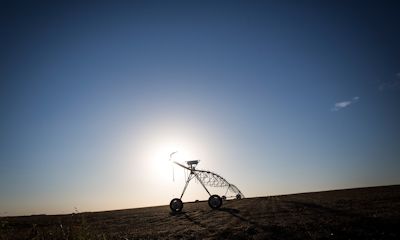October 5, 2016

.jpg?width=150&auto=webp&quality=80&disable=upscale)
With two remaining candidates vying for the presidency, now is the time to engage their transition teams to advance a consistent and thoughtful federal water policy that looks to meet all of the needs of the West and the nation.
The U.S. should set an overriding national goal of protecting our self-sufficient food producing capabilities. Policy decisions on a wide range of issues should then be evaluated to be sure they are consistent with that goal – especially water policy decisions where adequate irrigation water supplies are the key component of agricultural production.

It's time to engage the conversation with both parties on the need for a consistent Western water policy. (Photo: Andrew Burton/Getty Images)
States and local governments must consider the impacts of continued growth that relies on water transfers from agriculture and rural areas and to identify feasible alternatives to those transfers.
State laws and institutions must be given deference in issues relating to water rights and water resource allocation, use, control and transfer. The best decisions on water issues happen at the state and local level. When water laws and environmental laws conflict, balanced solutions must be found that respect the socioeconomic realities of the West.
The negative impacts of today’s droughts and water shortages have reached staggering levels for farmers and ranchers, their families and the irrigated agricultural economy. Unfortunately, these impacts are driven in part by current federal environmental regulations, triggered by fixed calendar dates or singular operational thresholds. Important species distribution or other relevant environmental factors are often not considered. Such approaches are inflexible, inefficient, and ineffective. In many cases, federal agencies have more flexibility under existing environmental laws and regulations and should encourage a cooperative approach toward achieving multiple goals. Where such flexibility currently exists in laws, agencies should use it promptly and with a minimum of bureaucratic delay. Time is of the essence when making water management decisions during a drought.
Make an investment
We must invest (and reinvest) in the Western water infrastructure necessary to meet current and future demands. Our existing water infrastructure is aging and in need of rehabilitation. New water supply infrastructure must be developed to replace diminishing snowpack during drought conditions, provide for growing recreational and environmental needs, allow for population growth, and protect the economic vitality of the West.
To make our forests healthy again and to prevent disasters to our watersheds and communities, the new Administration needs to work with Congress to streamline environmental processes to get forest treatment projects on the ground. In addition, the budget process of “fire borrowing”, which yearly robs treatment funds to address fire disasters must be stopped to allow the Forest Service to fight fires and protect our forest and watershed health.
Stakeholders in the West can find solutions to complex water conflicts that protect our Nation’s ability to feed ourselves, export food to others, and continue to lead the world in agricultural production, all the while finding ways to accommodate the water supply needs of continued urban growth, recreational demands, and environmental requirements. Fair, balanced, and long lasting solutions will not come easily. They will require visionary leadership and a firm commitment to a sensible, workable policy.
- Keppen is executive director for the Family Farm Alliance, a west-wide coalition of farmers, ranchers, irrigation districts and allied industries that advocates for reliable and affordable irrigation.
You May Also Like




